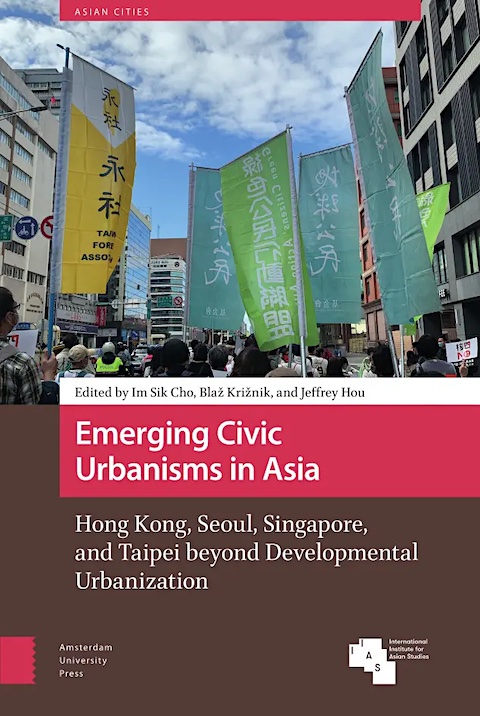With Im Sik Cho and Jeffrey Hou
Emerging Civic Urbanisms in Asia: Hong Kong, Seoul, Singapore, and Taipei beyond Developmental Urbanization, pp. 15-40
Im Sik, Cho, Blaž Križnik, Jeffrey Hou (eds.)
Amsterdam University Press | Amsterdam | 2022 | ISBN 9789463728546
Citizens and communities are becoming increasingly involved in shaping neighbourhoods and cities in Asia. These emerging civic urbanisms are a result of an evolving relationship between the state and civil society. The chapter introduces Hong Kong, Seoul, Singapore, and Taipei as cases to explore how the changing state–civil society relation affects citizen participation in shaping the living environment and gives rise to the recent surge of civic urbanisms. It provides an overview of historical state–civil society relations and their impact on developmental urbanization across the region. Civic urbanism as an explanatory framework is introduced and contextualized here with a brief overview of each city. Finally, the chapter identifies the major themes of civic urbanism and introduces case studies discussed in this volume.
Source: doi.org/10.5117/9789463728546.

 In parts of Asia, citizens are increasingly involved in shaping their neighbourhoods and cities, representing a significant departure from earlier state-led or market-driven urban development. These emerging civic urbanisms are a result of an evolving relationship between the state and civil society. The contributions in this volume provide critical insights into how the changing state–civil society relationship affects the recent surge of civic urbanism in Hong Kong, Seoul, Singapore, and Taipei, and the authors present eighteen cases of grassroots activism and resistance, collaboration and placemaking, neighbourhood community building, and self-organization and commoning in these cities. Exploring how citizen participation and state–civil society partnerships contribute to more resilient and participatory neighbourhoods and cities, the authors use the concept of civic urbanisms not only as a conceptual framework to understand the ongoing social and urban change but as an aspirational model of urban governance for cities in Asia and beyond.
In parts of Asia, citizens are increasingly involved in shaping their neighbourhoods and cities, representing a significant departure from earlier state-led or market-driven urban development. These emerging civic urbanisms are a result of an evolving relationship between the state and civil society. The contributions in this volume provide critical insights into how the changing state–civil society relationship affects the recent surge of civic urbanism in Hong Kong, Seoul, Singapore, and Taipei, and the authors present eighteen cases of grassroots activism and resistance, collaboration and placemaking, neighbourhood community building, and self-organization and commoning in these cities. Exploring how citizen participation and state–civil society partnerships contribute to more resilient and participatory neighbourhoods and cities, the authors use the concept of civic urbanisms not only as a conceptual framework to understand the ongoing social and urban change but as an aspirational model of urban governance for cities in Asia and beyond.